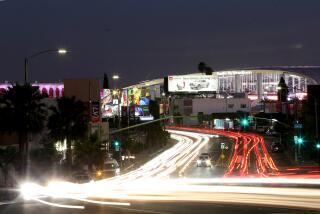Bias Seen in Opposition to Expanding South’s 1st Rapid-Transit Lines : Atlanta: Suburban residents say if the city’s transit system comes into their neighborhoods, more crime will come with it. That contention is widely seen as racist.
- Share via
ATLANTA — Ten years after gleaming silver trains started rolling along the South’s first rapid-transit system, a 1,582-mile network of 150 bus routes and two rail lines with 29 stations carries 250,000 passengers a day.
The Metropolitan Rapid Transit Authority has been hailed for its record of safety and cleanliness. It celebrated its trains’ 10th birthday with free rides on July 4 that drew a record 435,000 passengers. A revitalized Underground Atlanta, a shopping and entertainment area, draws up to 100,000 extra passengers a week, many of them first-time riders.
But the transit authority has a problem: It increasingly goes where much of Atlanta isn’t.
When the rapid-transit system was started in 1971, the three suburban counties that refused to join it--Cobb to the northwest, Gwinnett to the northeast and Clayton to the south--were largely rural, and it was hard to imagine subway cars rolling past farms and forests.
Those three counties now hold nearly 900,000 people, three-fourths the number in the two central counties, Fulton and DeKalb, where the system operates.
Despite the fact that suburban traffic is getting worse and suburban jobs go begging because car-less workers cannot reach them, opposition to expanding the system remains. Joining the transit system would almost surely mean higher taxes for the three counties, and suburban politicians have been loath to submit to decision-makers in Atlanta.
But the chief reason given by many opponents is the fear that rapid transit will bring crime to their tranquil neighborhoods. That feeling is widely seen as racism: The system’s passengers reflect central Atlanta, which is predominantly black.
“The people you hear opposing (rapid transit) in Cobb and Gwinnett . . . they’ve been pretty open about it. They don’t want black people coming into their areas,” said the Rev. Joseph Lowery, a civil rights leader and a member of the transit authority’s board since 1975. “It’s blind prejudice and fear.”
“We feel it’s in everyone’s interest to have a regional transit agency providing all the service,” said the authority’s general manager, Kenneth M. Gregor. “It makes sense, it’s much more cost effective, unencumbered by the problems of numerous political jurisdictions. I think that position ultimately will prevail.”
“I think (the Metropolitan Rapid Transit Authority’s) future is contingent on that,” said Lowery. “Its maximum potential will never be realized until we go north to Cobb and Gwinnett and south to Clayton . . . . We at least need five counties.”
End-of-the-line stops on the system’s cross-shaped rail system do a booming business as thousands of Cobb and Gwinnett residents drive across the county line and hop on the train. Some luxury hotels in Cobb have even sent vans to ferry workers across the Chattahoochee River, which marks the county line.
But transit authority trains and buses are not going to cross that line anytime soon.
“They’re pretty much against it, at least in my end of the county,” said Gwinnett County Commissioner Curtis McGill. “A number of the people who have moved into the south end are transplants from DeKalb County, and a lot of them feel like (the transit authority) ran them out of town.”
“Without being obvious, people say that ease of transportation would bring in ‘the undesirables’ and crime,” said Gwinnett County Commission Chairman Lillian Webb, who has advocated at least a trial run of rapid-transit buses.
Even talking about the transit authority can be tricky in the suburbs. A discussion group with Cobb County leaders in 1980 had a “code name so folks wouldn’t know about it,” Gregor said.
But, more and more, suburban Atlanta may be coming to the conclusion that something must be done. A one-mile trip down a major thoroughfare in Cobb or Gwinnett can take more than a half-hour, and residents of those counties named traffic as their No. 1 problem in a recent Atlanta Journal-Constitution poll.
The poll found that between 54% and 60% of Cobb, Gwinnett and Clayton county residents favored rapid-transit trains in their communities, although only in Cobb County was a majority willing to pay the 1% sales tax that residents of Fulton and DeKalb counties pay for rapid transit.
Meanwhile, Cobb County last month started its own five-route bus system. Ten thousand people used it in the first week, more than twice the volume expected for the first three weeks, forcing officials to drop a radio advertising campaign for fear that they would not be able to meet the demand.
The busiest Cobb Community Transit route is one dropping commuters at a mid-town Atlanta rapid-transit subway station. Ultimately, the service plans 10 routes, including three more Atlanta express runs.
More to Read
Sign up for Essential California
The most important California stories and recommendations in your inbox every morning.
You may occasionally receive promotional content from the Los Angeles Times.













